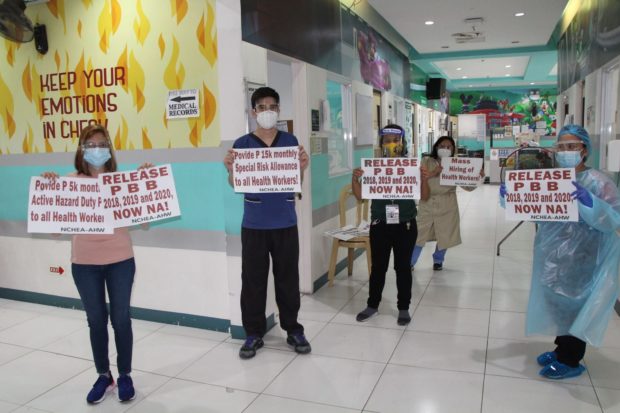
FILE PHOTO: Health workers from different public hospitals staged a simultaneous noise barrage and protest from wards to demand the immediate release of withheld benefits and urgent mass hiring of health workers to handle COVID-19 patients. Image from Alliance of Health Workers
MANILA, Philippines — Marikina City 2nd District Rep. Stella Quimbo has sought an investigation on the alleged failure of the Department of Health to pay the benefits of healthcare workers under the Bayanihan to Recover As One-Act.
In filing House Resolution No. 2121, the legislator asked the House committee on good government and public accountability to inquire on the matter after many health workers claimed not having received any benefits provided by Republic Act No. 11494 or the Bayanihan 2.
Quimbo cited the complaints of the Alliance of Health Workers (AHW), which members include health workers from government hospitals, regarding the still undelivered promise under the law.
She said even health workers from private healthcare institutions have conveyed similar problems to lawmakers.
“Sa araw-araw na hirap ng mga frontliners natin ng dahil sa COVID-19, ang dagdag na pasakit at peligrong kanilang patuloy na hinaharap ay dapat may tamang bayad at benepisyo” Quimbo said in a statement.
(The everyday sacrifices our frontliners do for us because of COVID-19, and the added burdens and dangers they continue to face should be aptly compensated.)
“Mabigat na ang pasan nilang responsibilidad, yet we can’t provide the benefits that rightfully belong to them? Unacceptable.” she added.
(The responsibilities they carry are heavy enough, yet we can’t provide the benefits that rightfully belong to them? Unacceptable.)
READ: Health workers demand unpaid benefits as Bayanihan 2 expires
Some of the benefits explicitly stated in the Bayanihan 2 include compensation for those who contract COVID-19 while in the line of duty. Under the law, health workers who fall ill due to COVID-19 under this category will each receive compensation amounting to P15,000 for mild cases and P100,000 for severe cases.
In case of death, the family of the health worker should receive P1 million from the government as provided under the law.
READ: Healthcare workers’ benefits under ‘Bayanihan 2’ stay — Angara
Quimbo also said the Bayanihan 2 had provisions for accommodation, free meals, and transportation to public and private health workers.
The lawmaker, an economics professor at the University of the Philippines, explained that there was enough funding for these provisions as P13.5 billion was allocated for such allowances and benefits. She stressed that the DOH should explain.
“13.5 billion pesos was appropriated for these allowances and benefits under Bayanihan 2. Dapat siguraduhin natin na ang bawat piso na inilatag dito ay napunta sa kanila,” Quimbo stressed.
(P13.5 billion was appropriated for these allowances and benefits under Bayanihan 2. We should ensure that every single peso laid out here goes to them.)
“The DOH should determine the reasons for such failure and identify viable solutions to give healthcare workers the benefits due to them. Ito ay para masigurado na mabilis na makakarating sa ating frontliners ang pondong nakalaan para sa kanila,” she added.
(The DOH should determine the reasons for such failure and identify viable solutions to give healthcare workers the benefits due to them. This is to ensure that the funds allocated for the frontliners would immediately reach them.)
DOH has been facing a deluge of criticisms lately, especially after the Commission on Audit released its scrutiny of the health agency’s pandemic budget in 2020, finding deficiencies in the way the DOH managed P67.32 billion of its COVID-19 fund.
According to COA, the deficiencies were caused by non-compliance with pertinent laws and regulations, leading to missed opportunities for the DOH which was primarily tasked to manage the pandemic.
READ: COA finds deficiencies in how DOH manages P67.32-B COVID funds
These issues, COA noted, also cast doubt on the regularity of DOH’s transactions while keeping much-needed funds at bay and unspent.
A list of recommendations to Health Secretary Francisco Duque III was also specified by the COA, centering on reminding and directing unit heads to act urgently in utilizing funds allocated to fight the COVID-19 pandemic, while instructing the administration and financial team to closely coordinate and “conduct regular/periodic assessment” on the utilization of COVID-19 funds.